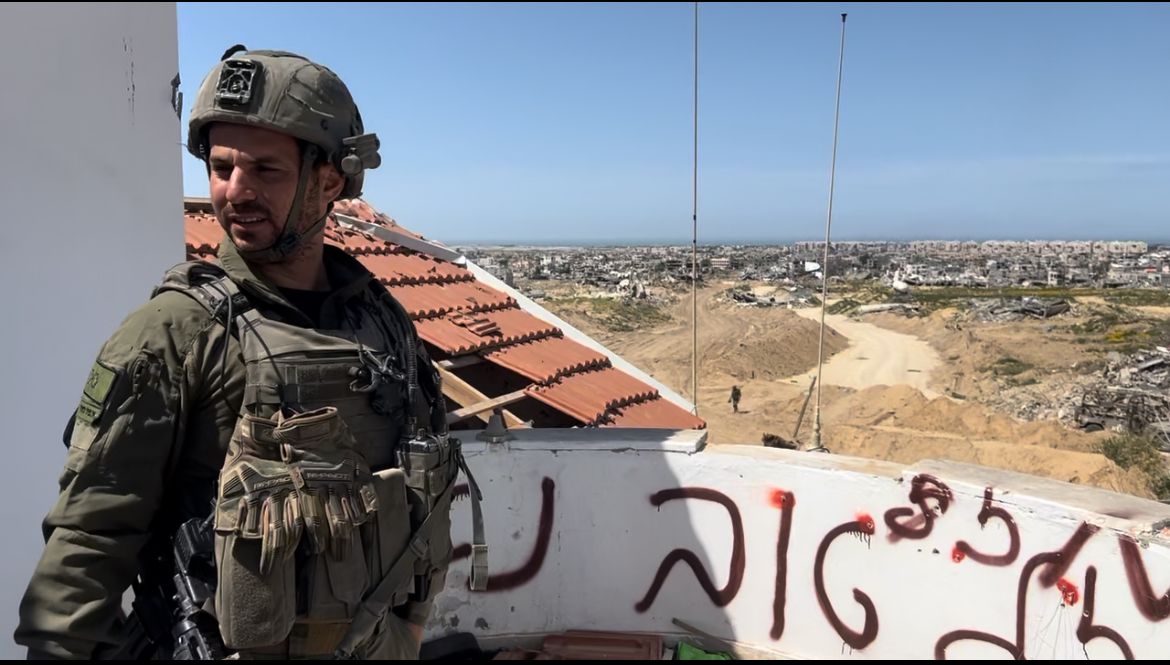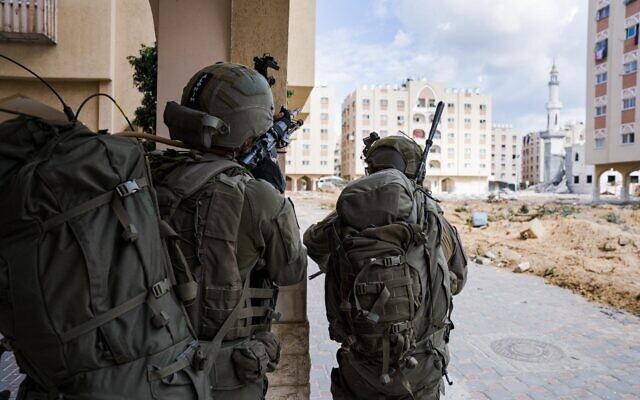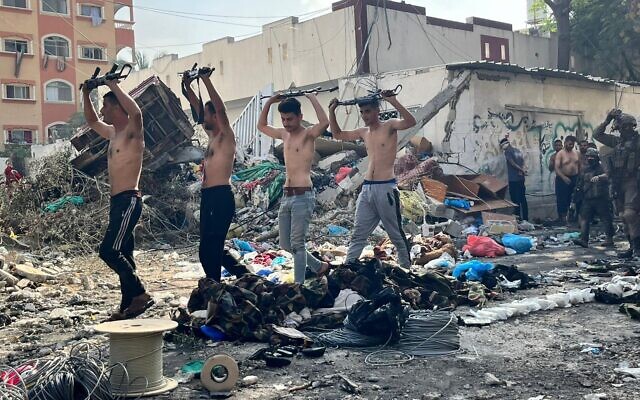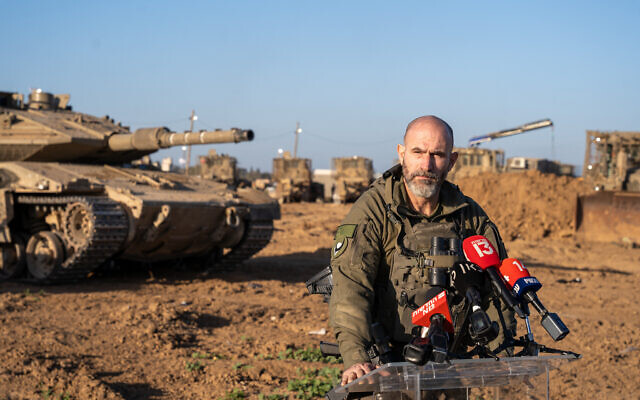



AL QARARA, Gaza Strip — Five and a half months into the war against Hamas, the combat engineers of the 603rd Battalion have seen more fighting than most IDF soldiers see in a lifetime.
The young troops have fought under the 7th Armored Brigade since the beginning of the ground offensive against Hamas, starting in Gaza City before heading south to Khan Younis. For the first part of the war, they lived inside their Namer armored personnel carrier. Now they see being able to sleep in blasted-out Gazan homes as a luxury.
The sappers don’t remember how many hundreds of structures they’ve brought down with their explosives, nor are they counting. They pass time inside the Namer smoking, listening to music, and trying to break the platoon record for solving a Rubik’s cube, something they all learned to do during the war. Some can do it in under a minute.
On Thursday, a cool pleasant spring day, the soldiers weren’t even aware they would be laying more mines that day inside damaged homes in Al Qarara, a town just north of Khan Younis.
When their officer told them to start preparing the explosives as the rear hatch of the APC opened, the sappers straightened up, rummaging around for their helmets and putting out their cigarettes. After filing out of the rear hatch and going through a broken wall, they tossed a dozen heavy circular mines into the kitchen of what was a family home before October 7. One began unscrewing caps in the center of the mines, as others packed them with plastic explosive putty.
They worked with quiet efficiency, the platoon commander telling them how many mines were needed in each room in order to bring the structure down. Once these were in place, they started connecting plastic wires so that the explosives could be detonated later that night.
The sappers focused entirely on the task at hand, ignoring the tanks firing their machine guns and occasionally their cannons just outside the windows.
They also took no interest in the household items that told some of the story of the family that had lived there — the red Quran on a chair, the clothes of a tween girl in one of the bedrooms, the food left in the fridge. The logo of UNRWA — the embattled UN agency for Palestinian refugees, under fire for the alleged involvement of some staff members in the October 7 attack — was on notebooks and olive oil containers, an indication of how important the organization was to the daily lives of Gazans.
Their goal — appropriate for soldiers at the tactical level — was to complete the job quickly and correctly, then to clamber back into the Namer for a few minutes of sleep or another cigarette before reaching the next home they needed to bring down.
That single-minded focus on the mission at hand was shared by Lt. Col. Ofir Caspi, commander of the 82nd Armored Battalion under which the combat engineers were operating.
“I don’t know what the complete picture is,” said Caspi from the three-story home that serves as his command post. “When we are going to Rafah, I don’t know.”
The last four Hamas battalions remain in Rafah, a city on the Gaza-Egypt border. US President Joe Biden has warned Israel against a major operation in the crowded city, but Prime Minister Benjamin Netanyahu and other Israeli leaders insist that the IDF will go into Rafah to complete the destruction of Hamas’s military structure.
Caspi, who was only vaguely aware of what day it was and that the Purim holiday was upcoming, hasn’t given much thought to why he hasn’t been ordered into Rafah thus far.
“I imagine there are reasons we are not going into Rafah,” he said. “The population, civilians, Joe Biden. It’s not only what the IDF wants. It’s what the world wants.”
But Caspi is confident he can capture anything in the city he is told to, when the order is given. “If I press play, I am in Rafah, within an hour, with the battalion. Whatever you want in Gaza, from south to north, east to west, say the word, the 7th brigade is there.”
“Where do you want? Philadelphi. We’ll be there,” he boasted, referring to the strategic road dividing Gaza from Egypt, under which Hamas smuggled at least part of its vast arsenal over the past two decades.
Not surprisingly, Caspi — who has been injured three times in the war and has shrapnel still embedded in his body — is eager to get at the Hamas fighters in Rafah.
“I’d be happy to eliminate Hamas tomorrow morning, or tonight.”
He rejected the idea that the IDF is running in place in the campaign against Hamas, returning to areas already captured to eject Hamas once again.
“In the 7th Brigade, we are not spinning our wheels at all,” he said. “The mission is very clear. We know exactly what we are doing.”
His battalion is securing the corridor running into Gaza from Kibbutz Ein Hashlosha, the main logistical route for Division 98’s operation in Khan Younis, which began in December. His battalion was on the offensive north of the corridor on Thursday, expanding it by pushing into suburbs that the IDF hadn’t previously cleared.
His troops were also trying to catch Gazans moving north from Rafah to loot empty houses in Khan Younis — to determine whether they are just looking for food, or are being used by Hamas to gather intelligence.
Caspi said that he has found weapons and uniforms in every other house he has searched, and that there is anti-Israel propaganda everywhere. He said he has even come across pictures of himself and his wife in Hamas intelligence reports.
“I thought they were a nothing organization, but believe me, they’re a serious organization,” he said.
At the same time, he believes Hamas is on its last legs as a coherent fighting body.
“I say if we are here another two months, the organization is finished in terms of its fighting spirit,” he said.
“They don’t have any spirit” when its fighters come to the impromptu IDF civilian inspection points to surrender, Caspi elaborated.
“We encountered hundreds of terrorists who knew they would be caught, and it was convenient for them to leave the war, to receive food, to get away from the shit,” he said. “From interrogations, we understand that the organization is done.”
But he is not confident that it will stay that way.
His “personal opinion,” he said, is that the surrendering terrorists “understand that after the war no one else wants to be here, and that Hamas will return to power,” so they would rather lay down their weapons and be held in Israeli custody for now than risk being killed by Hamas for fleeing.
Despite the hyperfocus on the mission at hand, Caspi, speaking to The Times of Israel and several other Israeli journalists on the trip, also offered his opinion on a controversial political issue, the future of Gaza after the war: “We have to hold the territory. The solution in my opinion is to build settlements, but that’s a political matter. How do we stick a finger in Hamas’s eye? I think that if we build settlements, we’ve defeated them. If we kill [Hamas leader Yahya] Sinwar, I don’t think we’ve won.”
“There is an ideology that has seeped in over the course of decades [among Gazans] that they have to kill everyone,” he charged. “I think that if we kill Sinwar, we will not defeat the organization. We might damage it badly, but someone else will rise up and continue the ideology. Just like there are settlements in the West Bank, there should also be settlements here. There is no other solution.”
These comments by Caspi, reported by The Times of Israel and the other Israeli journalists on Friday, landed him in trouble. The IDF summoned him for a “clarification” by phone later that day with the commander of the 36th Armored Division, Brig. Gen. David Bar Khalifa, who reprimanded him for his “irregular remarks which are not in line with IDF protocols and what is expected of an IDF commander.”
“The officer took back his words and expressed regret,” the IDF said.
Netanyahu and other members of the war cabinet have repeatedly said that Israel will not support renewed Israeli settlement of the Strip.
However, 11 cabinet ministers and 15 coalition MKs participated in a January conference calling for the reestablishment of settlements, with ultra-nationalist National Security Minister Itamar Ben Gvir calling for the “voluntary” emigration of Gazans from the territory, and Communications Minister Shlomo Karhi of the Likud even endorsing the forcible transfer of Palestinians from Gaza.
Caspi’s current commander in Khan Younis, Division 98 commander Dan Goldfus, sparked his own controversy two weeks ago when he criticized political leaders in front of the cameras. He, too, was summoned for a clarification.
Despite his dim view of chances for peace with Gaza’s population, Caspi emphasized that he devotes significant attention to humanitarian issues, including bringing in fuel to Nasser Hospital in Gaza City and to UN facilities, and handing out food and water to civilians fleeing the battle.
“When you fight in dense urban combat, there is a population there,” he said. “We evacuate the civilians first; I deal with that a lot.”
“I don’t hate people,” he said. “We have very clear rules of engagement.”






